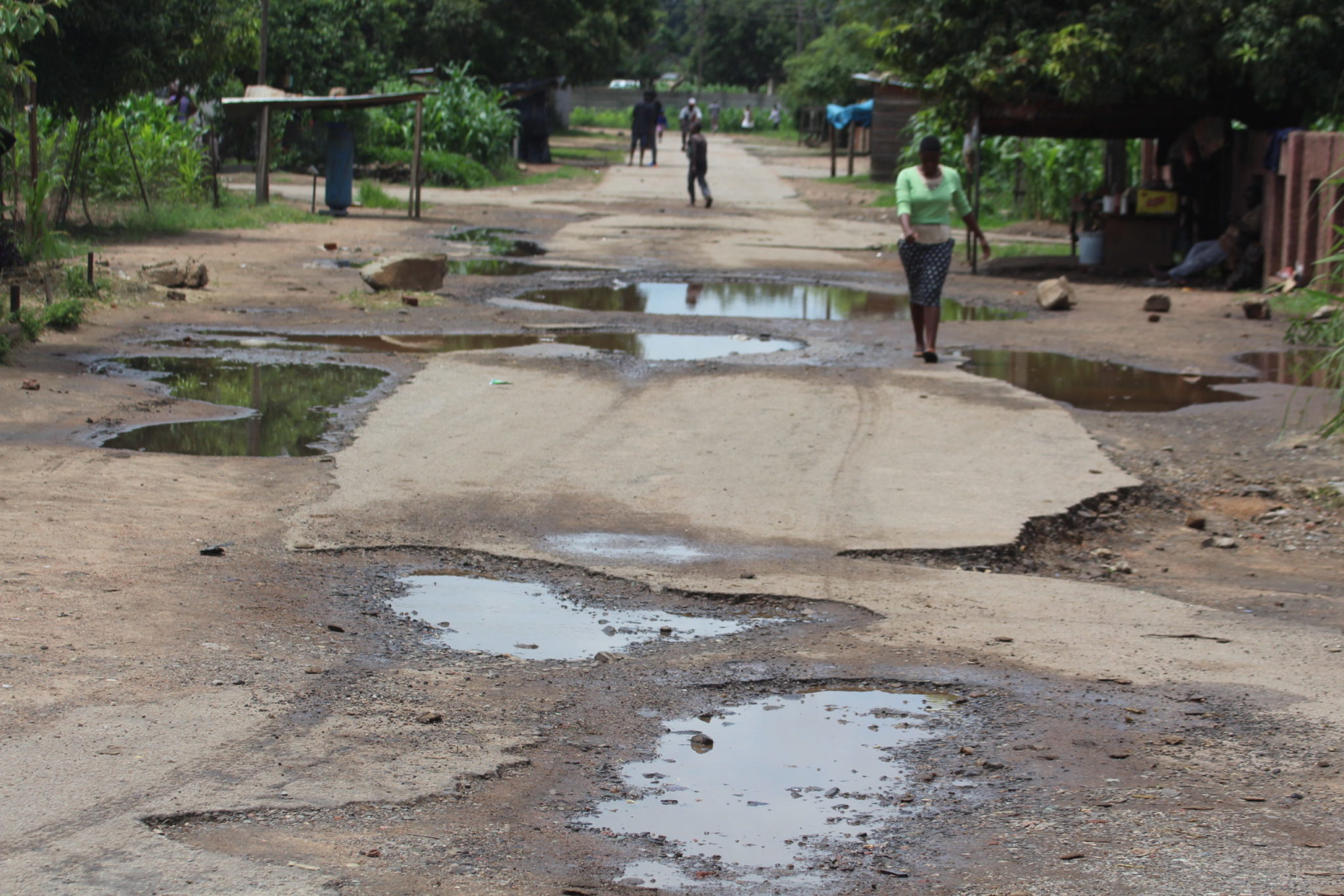Participatory democracy, transparency and decentralisation are important elements that determine the level of service provision from Zimbabwe’s local authorities

A Highfield, Harare, resident disposes of refuse at a street corner. PHOTO CYRIL SANHEHWE
Zimbabwe has 92 local authorities, 32 of them urban and 60 rural. These local authorities draw their power and functions from the Constitution of Zimbabwe (in particular Chapter 14), the Rural District Councils Act (Chapter 29: 13), the Urban Councils Act (Chapter 29: 15), and the Regional, Town and Country Planning Act (Chapter 29: 12).
The preamble to Chapter 14 of the Constitution says: Whereas it is desirable to ensure: (a) The preservation of national unity in Zimbabwe and the prevention of all forms of disunity and secessionism; (b) The democratic participation in government by all citizens and communities of Zimbabwe; and (c) The equitable allocation of national resources and the participation of local communities in the determination of development priorities within their areas; there must be devolution of power and responsibilities to lower tiers of government in Zimbabwe.
Unlike in other countries such as South Africa, Uganda and Tanzania, local government in Zimbabwe does not enjoy autonomy as it performs the functions conferred on it by central government. The functions, while defined in law, are open to central government variation and reassignment to other state agencies.
In this regard, central government determines the birth, growth and death of local government, something that greatly compromises the function of the latter. Pre- and post-independence policy and structural developments have sustained centre-local relations that undermine the emergence of sound local governance.
Davison Muchadenyika, an urban specialist at the World Bank Group, argues that in both pre-and post-independence Zimbabwe, local government is a political reality that the ruling regime manipulates, associates with, and uses to advance political interests.
“Politics continue to shape and destabilise a functioning, independent, and autonomous form of urban governance in Zimbabwe. Urban governance remains under incessant threat from central government. Central-local government contestations are leading to poor service delivery; a development that is affecting social change,” Muchadenyika says.
Harare Mayor Herbert Gomba, who will lead the council for the next five years, said he is working on a programme to transform the capital city. “I have a transformation agenda for the city, which I am going to be implementing with my councillors,” he said. “This includes the rehabilitation of roads; we want to put in spaghetti roads and make service delivery a priority for the citizens of Harare in the next five years. We hope that government is also going to help us as councillors to bring these services to our residents.”
Local authorities perform a variety of functions, chief among them the provision of water and sanitation, housing, refuse collection, road maintenance, and health and education services. Key service-delivery challenges emanate from internal governance systems in local authorities; relations with other key stakeholders such as citizens, civil society and the private sector; and the political and economic environment. A synopsis of such challenges points to innovation on the part of local authorities so as to “insulate” service delivery from a debilitating operating environment.
Local government performs legislative and executive functions. Mandatory and permissive functions such as development, forward planning, financial management, governance and regulatory functions form the basis of local authority operations.
In Zimbabwe, the onset of the 21st century was marked by the beginning of unbridled socio-economic and political deterioration. Subsequently, Zimbabwe’s local-governance crisis resulted in both local public administration and service delivery failure.
A number of factors account for the local government crisis. Broad issues like restrictive planning laws, outdated planning approaches and antiquated institutional systems are other explanatory factors.

According to Shingirayi Mushamba, in his paper The Powers and Functions of Local Authorities (2010), the local government system’s basic problem lies in centre-local relations. Present local government challenges of corruption, inefficient revenue systems, conflict, low citizen participation and poor public service delivery are ameliorable by changing the nature of centre- local relations.
A grouping operating under the banner “21daysOfActivism” last year issued a statement on service delivery in local authorities, saying it was “in a quagmire and much can be done to address fundamental challenges bedevilling that sector”.
“Current local government problems arise from the structure and nature of centre-local relations,” Muchadenyika says. “The capacity of local governments has been severely affected by conflict, political interference, bankruptcy, decentralisation without transfer of resources, competencies and decision-making authority to local level, corruption, low citizen participation and lack of accountability. This background necessitates the need to redefine and change centre-local relations.”
Muchadenyika argues that due to the new Constitution and the poor state of service delivery in Zimbabwe’s local governments, which is largely attributed to lack of autonomy, local government reforms should be premised on changing centre-local relations.
“Post-2000, centre-local relations saw central government attempting to recentralise local government,” Muchadenyika says. “This resulted in the weakening of local authorities, rendering them ineffective and inefficient in delivering their service delivery mandate. The relations between the state and local authorities became that of master and servant, with the former usurping most of the powers of the latter.
“The current state of local government services such as poor transport and road infrastructure, a massive housing backlog, weak water and sanitation systems, weak financial management systems, and inefficient management systems and competencies, all point to the centrality of changing centre- local relations.”
The 21DaysOfActivism grouping accused the ministry of local government and housing of failing “dismally” to provide policy direction to enable a better working environment for local councils and boards. The city authorities were not spared either.
“They are to blame for failure to provide clean and safe water for drinking despite residents paying bills. We call upon the city of Harare and all councils and boards to ensure that ratepayers come first before awarding themselves hefty salaries,” the group said.
They also said it was disheartening to note how public officials in charge of public service delivery like refuse collection, water treatment, roads management, and public health are abusing public service delivery institutions to fill their pockets and have turned all taxation systems into fundraising schemes for their hefty and out-of-this world salaries. “The continued antagonism between the ministry of local government and local government authorities has fulfilled the adage that says, ‘when the elephants fight, the grass suffers and when they are making love its suffering continues unabated’.”
The group listed the following as priority areas: Quality and safe water for the people as enshrined in section 77 of Zimbabwe’s Constitution; the resurfacing of roads; refuse collection and dumping sites far away from residential areas.
“In the modern world, central-local relations are governed by the principles of local self-government, subsidiarity, delegation and general competence,” the group said. “In essence, a new vision of local governance is imperative for urban areas and cities to survive 21st century challenges. The new vision has to be informed by several theories that advocate for a local government system anchored in participatory democracy, transparency, decentralisation and less bureaucracy.
“Participatory democracy, transparency and decentralisation are important elements that determine the level of service provision from local authorities. In African countries, the failure of most central governments to provide adequate services to citizens has left local governments at the forefront of local service delivery,” the group said.

Potholed road, Highfield, Harare. PHOTO Sadat Sanhehwe
Moving forward, centre-local relations should be focused on reforming planning, budgeting and finance, human resources, and expenditure and service functions. This is mainly because there are operational challenges in these four pillars which are rooted in how central govenment relates to local government.
The aforementioned four reform areas are important pillars for an effective and efficient local government system. Funds allocated to local authorities should not be disbursed through the local government ministry but accessed directly from the treasury. This shift is expected to speed the disbursement process and reduce control and abuse of local authorities by their parent ministry. Conditions of service for local authority workers should also be improved as a way of luring experienced and well-qualified staff.
Former Harare Mayor Bernard Manyenyeni concurred with this view when he conceded the council was deceiving residents by offering poor services, which he described as “service deceivery”, as salary and benefits gobbled 80% of the city’s revenue. In his third and last state of the city address last year, Manyenyeni decried the calibre of prospective councillors, saying he did not think they had what it took to turn the city’s fortunes around. The council, he said, could fix the city by getting its priorities straight, by focusing on the basics and by paying attention to the bread and butter issues of service delivery.

Local authorities’ service functions have been weakened due to institutional inadequacies. Development and forward-planning functions need further capacity building and to embrace strategic spatial planning, new land administration and registration approaches, comprehensive infrastructure development planning, and participatory urban planning systems.
Reforms focused on planning functions should therefore address major current and emerging urban challenges, especially climate change, rapid urbanisation, poverty, informality and safety.
Regulatory functions should move from assuming that local authorities control how development should take place to recognising that other stakeholders such as the private sector, residents’ organisations, academia and research institutes, and civil society organisations have a role in planning future development trajectories.
Local Government Minister July Moyo said councillors should put service delivery ahead of receiving allowances or amassing ill-gotten wealth from their councils. In line with Manyenyeni’s observation, he said local authorities must introduce capacity-building programmes for councillors, mayors and other local government employees.
The Zimbabwe Institute (2005:20) has said the central government must introduce a policy which insists on the training of councillors on the value and importance of shared leadership and the general qualities of a good and effective leader. Most councillors and mayors lack the knowledge and competencies required in the field of local government management. The introduction of training programmes for councillors would, therefore, help improve their participation in council affairs and, hopefully, improve service delivery.
Barnabas Thondhlana has worked for Dow Jones and Bloomberg newswires as their Zimbabwe correspondent. He is the publisher of three community newspapers and a national daily, and a media trainer in investigative journalism. He has been instrumental in the formation of several independent newspapers, including the Zimbabwe Independent, The Daily News, The Daily News on Sunday, Newsday and The Observer.








